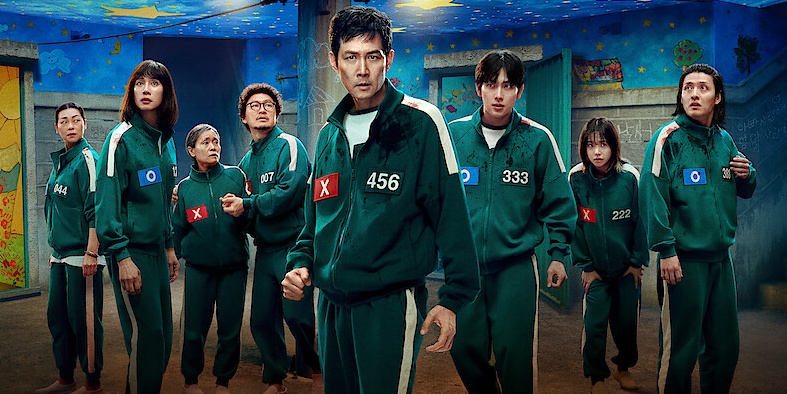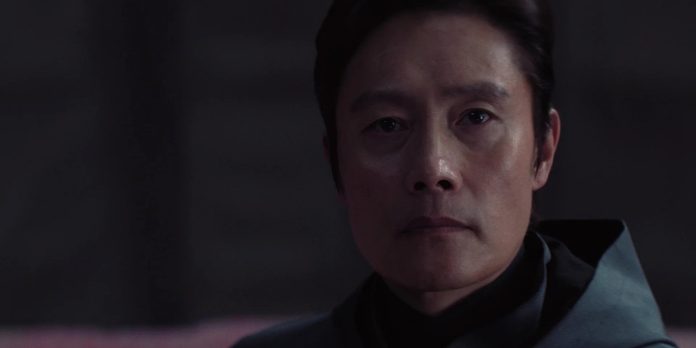THE STORY – Hundreds of cash-strapped players accept a strange invitation to compete in children’s games. A tempting prize awaits, but with deadly high stakes.
THE CAST – Lee Jung-jae, Lee Byung-hun, Wi Ha-joon, Im Si-wan, Kang Ha-neul, Park Gyu-young, Kang Ae-shim & Jo Yu-ri
THE TEAM – Hwang Dong-hyuk (Showrunner/Writer/Director)
The third season of “Squid Game” marks a significant milestone for Netflix and the broader streaming era. One of the platform’s flagship titles, and arguably one of television’s biggest phenomena in recent memory, now comes to a close. It’s remarkable to reflect on how showrunner Hwang Dong-hyuk’s twisted game of horrors broke language and cultural barriers to become so influential in such a short time. It remains one of those rare TV experiences that simply cannot be replicated, no matter how much Netflix might try to convince you otherwise with this final season.
Yet, as audiences return to the games just months after the second season’s cliffhanger, they will likely be disappointed to find that Hwang’s conclusion is the show’s least cohesive entry. It is a fall from grace that underscores how the heights of its first season have never quite been matched.
Season two ended with Lee Jung-jae’s Seong Gi-hun at his lowest point, having failed to dismantle the Squid Games from within and losing many allies along the way. Meanwhile, Lee Byung-hun’s Hwang In-ho, the Front Man, abandoned his role as a saboteur and returned to orchestrate the final stages of the deadly spectacle. His brother, Hwang Jun-ho (Wi Ha-joon), edges closer to exposing the truth as he hunts for the island where these brutal games unfold.
But season three finds Hwang Dong-hyuk’s writing at its most scattered. Storylines established last season drag on well past their point of interest, stretching the show’s momentum thin despite some narrative progress. Audiences already tired of watching Jun-ho wander around in circles to retrace memories and locate the island are finally given a hint of payoff, but it feels incremental at best. Whenever the show shifts away from Gi-hun and the games themselves, it loses its tension and makes viewers wish they could skip ahead to the central conflict.
Still, Lee Jung-jae’s performance provides the emotional core that keeps the season afloat. Watching Gi-hun reach rock bottom, hardened by the relentless bloodshed he cannot stop, shows Lee at his most restrained and internalized. Gi-hun has lost his drive to survive or to kill, and the arc that follows, in which he claws back some sense of purpose when a new player enters the game, becomes one of the few truly compelling threads here.
Unfortunately, Lee Byung-hun is wasted. The Front Man’s intriguing evolution in season two is cast aside as he reverts to a simple, menacing figurehead. This deprives the audience of the fascinating dynamic that had begun to develop between him and Gi-hun.
Some new players do step up. Kang Ae-shim’s Jang Geum-ja, for instance, is riveting. Her devotion to keeping her son alive and the moral conflict that comes with it give the season one of its few truly effective storylines. Jo Yu-ri also impresses as the pregnant Kim Jun-hee, caught at an emotional crossroads. When Kang is on screen, the show briefly reminds viewers why it once felt unmissable.
But three seasons in, the cast of survivors can no longer match the impact of the original crew. Hwang’s refusal to shake up the formula leaves the final season feeling predictable at best. When the story does stray from its template, it often misfires, especially with the increased presence of the cartoonish VIPs. These wealthy benefactors get far more screen time and far more terrible dialogue, delivered so woodenly that viewers may wonder how much was recorded in post-production. While the VIPs still fit the show’s pulpy style, the awkwardness of translating Hwang’s vision into English dialogue has never felt clunkier.
Ironically, “Squid Game“ is weakest when it is not in Korean, yet this is exactly where the show chooses to plant its flag for what it calls a finale. Every storyline lands with a neat bow that feels unearned and seems more interested in setting up franchise expansion than closing this story with the weight it deserves. Hwang even recruits an Academy Award-winning actor to help launch what is next.
“Squid Game“ was never the pinnacle of television craft, but it was a cultural time capsule of post-COVID entertainment that did more than just shock and entertain. If this franchise really plans to extend beyond Korea and the original premise, it needs to deliver more than recycled twists, especially if rumors are true that David Fincher might step up to take his own violent swing at it.

THE GOOD – Lee Jung-jae is still terrific. There’s some fun to be had in the final season, even if it’s nothing we haven’t seen before.
THE BAD – Hwang Dong-hyuk’s distracted writing leads to him indulging in his worst tendencies as a showrunner, spending more time away from what makes the series work. All of it builds to an unsatisfying ending, more interested in setting up a spin-off than properly concluding this series on a high.
THE EMMY PROSPECTS – None
THE FINAL SCORE – 5/10


